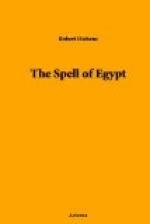One day I sat in the temple, in the huge court with the great double row of columns that stands on the banks of the Nile and looks so splendid from it. The pale brown of the stone became almost yellow in the sunshine. From the river, hidden from me stole up the songs of the boatmen. Nearer at hand I heard pigeons cooing, cooing in the sun, as if almost too glad, and seeking to manifest their gladness. Behind me, through the columns, peeped some houses of the village: the white home of Ibrahim Ayyad, the perfect dragoman, grandson of Mustapha Aga, who entertained me years ago, and whose house stood actually within the precincts of the temple; houses of other fortunate dwellers in Luxor whose names I do not know. For the village of Luxor crowds boldly about the temple, and the children play in the dust almost at the foot of the obelisks and statues. High on a brown hump of earth a buffalo stood alone, languishing serenely in the sun, gazing at me through the columns with light eyes that were full of a sort of folly of contentment. Some goats tripped by, brown against the brown stone—the dark brown earth of the native houses. Intimate life was here, striking the note of coziness of Luxor. Here was none of the sadness and the majesty of Denderah. Grand are the ruins of Luxor, noble is the line of columns that boldly fronts the Nile, but Time has given them naked to the air and to the sun, to children and to animals. Instead of bats, the pigeons fly about them. There is no dreadful darkness in their sanctuaries. Before them the life of the river, behind them the life of the village flows and stirs. Upon them looks down the Minaret of Abu Haggag; and as I sat in the sunshine, the warmth of which began to lessen, I saw upon its lofty circular balcony the figure of the muezzin. He leaned over, bending toward the temple and the statues of Rameses II. and the happy dancers on the wall. He opened his lips and cried to them:
“God is great. God is great . . . I bear witness that there is no god but God. . . . I bear witness that Mohammed is the Apostle of God. . . . Come to prayer! Come to prayer! . . . God is great. God is great. There is no god but God.”
He circled round the minaret. He cried to the Nile. He cried to the Colossi sitting in their plain, and to the yellow precipices of the mountains of Libya. He cried to Egypt:
“Come to prayer! Come to prayer! There is no god but God. There is no god but God.”
The days of the gods were dead, and their ruined temple echoed with the proclamation of the one god of the Moslem world. “Come to prayer! Come to prayer!” The sun began to sink.
“Sunset and evening star, and one clear call for me.”
The voice of the muezzin died away. There was a silence; and then, as if in answer to the cry from the minaret, I heard the chime of the angelus bell from the Catholic church of Luxor.
“Twilight and evening bell, and after that the dark.”




